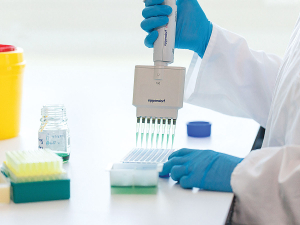Waste to Treasure: Growing value in winery waste
Wine companies have been "very generous" in gifting grape marc to a project working to transform the winemaking byproduct.
 Lincoln Agritech has been granted a $1 million contract from the Ministry of Business, Innovation and Employment to develop attenuated variants of disease-causing fungi that can be used to prime plants and protect against fungal diseases.
Lincoln Agritech has been granted a $1 million contract from the Ministry of Business, Innovation and Employment to develop attenuated variants of disease-causing fungi that can be used to prime plants and protect against fungal diseases.
Plant fungal diseases can be devastating for horticulture and agriculture - in the worst cases, wiping out entire crops.
But Lincoln Agritech scientists believe altering the bacteria associated with disease-causing fungi will lead to new strategies to protect crops.
They have picked up a $1 million contract from the Ministry of Business, Innovation and Employment (MBIE) to develop attenuated (weakened) variants of disease-causing fungi that can be used to prime plants and protect against fungal diseases. The research programme will run for two years.
"In previous research, we found that the bacteria associated with a fungus affect its ability to cause disease," Dr Jin-Hua Li explains. "Our approach will make fungi available to cause disease by changing the bacteria that are associated with the fungi."
Working with scientists from Scion, Utrecht University in the Netherlands and the Foundation for Arable Research, Lincoln Agritech scientists will test the concept on brassica plants (a genus of plants that includes cabbage, cauliflower, and broccoli).
"We will test these attenuated variants on brassica plants, such as broccoli and cabbage," Li adds.
"We will coat seeds with the altered fungus, then try to infect the seedlings with the original fungus to see whether our new products have protected the plant from infection."
Once the concept has been proven in brassica plants, it will be applied to cereal crops, and could potentially be used on several horticultural crops.
Li believes this new approach to protection will not only help New Zealand's horticulture and agriculture industries, but also provide an export opportunity.
"The global agrochemical industry is pivoting to develop new biological alternatives in response to urgent global demands for reduced chemical use."
Li gives as an example EU regulations which demand a 50% reduction in chemical pesticide use by 2030.
"Our novel biotechnology will help exporters meet the growing market demand for non-chemical disease control."
The sale of Fonterra’s global consumer and related businesses is expected to be completed within two months.
Fonterra is boosting its butter production capacity to meet growing demand.
For the most part, dairy farmers in the Waikato, Bay of Plenty, Tairawhiti and the Manawatu appear to have not been too badly affected by recent storms across the upper North Island.
South Island dairy production is up on last year despite an unusually wet, dull and stormy summer, says DairyNZ lower South Island regional manager Jared Stockman.
Following a side-by-side rolling into a gully, Safer Farms has issued a new Safety Alert.
Coming in at a year-end total at 3088 units, a rise of around 10% over the 2806 total for 2024, the signs are that the New Zealand farm machinery industry is turning the corner after a difficult couple of years.

OPINION: Meanwhile, red blooded Northland politician Matua Shane Jones has provided one of the most telling quotes of the year…
OPINION: This old mutt has been around for a few years now and it seems these ‘once in 100-year’ weather…